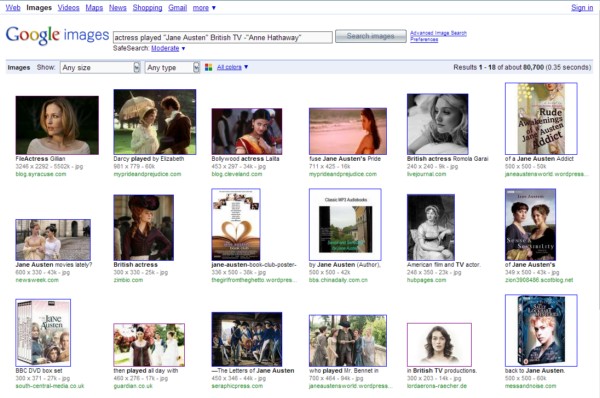Bing vs. Google rematch: Who's getting better, quicker?
That girl from that show. Any good search engine should respond to an explicit and well-phrased query, but we all know that not every user will be able to craft a query that will enable a search engine that catalogs images to associate an image with the phrase. Last June, we had our search engines try to pull up a picture of actor Rod Taylor, using only scant information about him. And it was funny perusing through catalogs containing Johnny Depp and Zachary Quinto and Arnold Schwarzenegger and a lost gosling on a rainy highway, all of which reside on pages whose terms had to do vaguely with the things in our query that had to do vaguely with Rod Taylor.
For our rematch, we portrayed a user looking for the picture and identity of an actress who portrayed author Jane Austen in a movie about Jane Austen, not by Jane Austen. I know, you're thinking Anne Hathaway; no, this one was from British TV, and for the sake of the challenge, we'll pretend we don't remember the name of the show. We'll know her when we see her.

With Google, as a lot of folks know, you can have it exclude results from a search query by preceding it with a little minus. That doesn't necessarily mean it won't pull up a picture of Anne, but it shouldn't pull up one inside a page where her name is listed. When we tried the query actress played "Jane Austen" British TV in Google images, we did indeed see several actresses in productions of Jane Austen novels, though we were surprised to see Gillian Anderson show up as entry #1, completely out of character. The caption for her name in the source page shows her as hosting the PBS Masterpiece series that features Jane Austen dramas, so that's how she got there. The lovely Indian actress in the #3 entry is named Aishwarya Rai, and she stars in an Austen knock-off called Bride and Prejudice.
But right there in row #3, success: The lady we're looking for actually appears twice, once from the show in question, once from her role in a Fox TV series called Dollhouse. The show that was actually on my mind is called Miss Austen Regrets, and the actress' name is Olivia Williams. (Hopefully my wife won't mind too much if you'll permit me to say that I adore this actress.)

When we try the exact same query in Bing, the first surprise is that a great many of the entries that are shown up top are not of women. That's when it hits you that Google's entries truly did center on women; it pulled up actresses and in many cases appeared to exclude actors. With Bing, we got two pictures of David Tennant ("Doctor Who"), Colin Firth (yes on the Jane Austen, no on the gender), novelist Gregory David Roberts (whose book was reviewed on a page containing another book review from an author who idolized Jane Austen -- not a joke), Nicholas Cage, Gene Wilder as Willy Wonka, Bruce Greenwood (twice) as Capt. Pike from Star Trek XI (what is Bing's deal with Star Trek XI?), and Australian Idol contestant Carl Risely.
One of Bing's filtering tools enables you to exclude everything but head shots, or head-and-shoulders shots. The Just faces tool limited our first 100 or so results to a dozen head shots, and for reasons we can't fathom yet, several head shots of actresses were excluded when actors were not. Case in point, Lindsay Wagner was excluded. Now, I can't think of a Jane Austen movie she's been in, but at least she's an actress, and I believe she still has a face.
How much tuning would we have to do for the Bing query to reveal one measly photo of Olivia Williams, without asking for her explicitly? If we add Masterpiece (the PBS series where her movie aired), for some reason Bing adds movie posters from Harry Potter and Pan's Labyrinth. When we replace Masterpiece with Dollhouse (the Fox show she's in), we get four items which don't include head shots at all -- one is a Grammy award, and the other is a news photograph of a car being tugged out of an icy retention pond.
So far in our rematch, it's Bing over Google winning two out of three. But that last run given up in the previous inning was a costly one for Bing.
Last June, it was obvious to us that Microsoft needed to make serious adjustments to its capability to discern contexts from information, if it was to ever have serious reason to claim usage share from Google. Two months later, however, the search engine that's making changes in the interest of becoming more competitive -- for better or worse -- appears to be Google. People use search engines to find stuff, not go browsing through stuff.
It was Microsoft that brought the issue to the forefront, when its Bing ad campaign made the point that if we all spoke to each other the way Google finds search results -- with rambling, often random associations thrown out willy-nilly -- we'd never make sense to anyone. It's a brilliant campaign, but so far, the search engine needs to live up to its billing. After two months, we find Bing is still lagging behind. After purchasing a space for Bing on #2 Yahoo, Microsoft continues to run the risk of being perceived as #3.
SEE THE ORIGINAL FACE-OFF FROM THE BEGINNING:
- Bing vs. Google face-off, round 1: Bing (2), Google (1)
- Bing vs. Google face-off, round 2: Bing (2), Google (2)
- Bing vs. Google face-off, round 3: Bing (2), Google (3)
- Bing vs. Google face-off, round 4: Bing (3), Google (3)
- Bing vs. Google face-off, round 5: Bing (3), Google (4)
